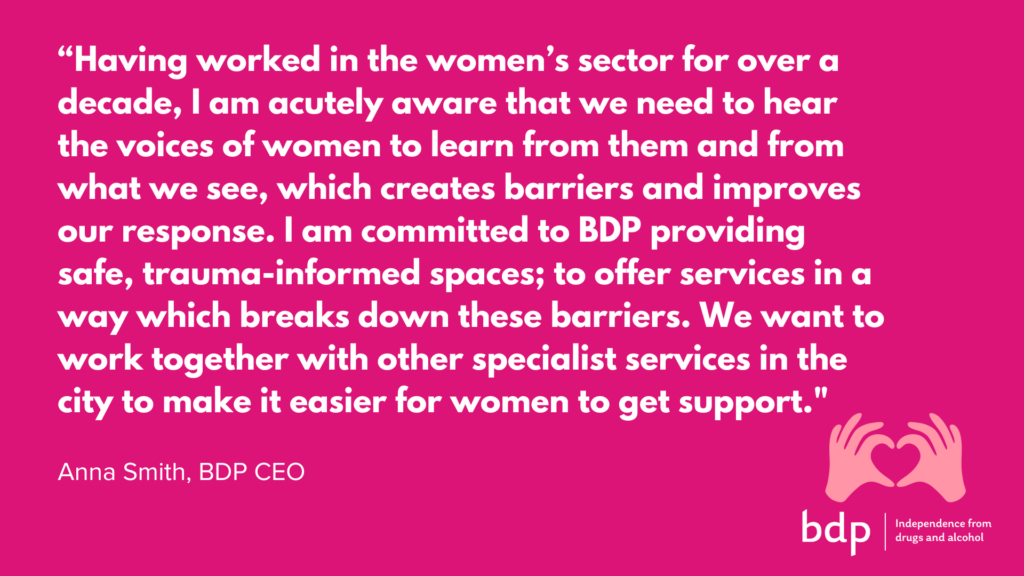08.03.24
6 minute read

This year’s International Women’s Day gives us a chance to reflect on women’s experience within our services and in the larger world of drug and alcohol treatment services in general.
This comes at a time when drug deaths among people who identify as women are on the rise. In 2022 (the most recent data available), deaths from drug poisonings were the highest since records began in 1993. However, between 2021 and 2022, the rate of males dying from drug poisoning went down slightly, whilst the rate for females continued to rise. Over the past decade this figure has risen by almost 80 per cent – yet the numbers of women seeking treatment across the UK has stayed largely the same. Any death is tragic, but we feel that this underlines the importance of making sure drug and alcohol services best serve the needs of the female population.
Women experience additional complexities from drug and alcohol use and find it harder to access support. In this blog, we are going to explore this and talk about what BDP is doing to mitigate them. So, what are some of the things that make accessing support harder for people who identify as female?
According to the statistics, drug use within the male population is much higher. This is reflected in the distribution of males and females who access support for their drug and alcohol use. However, it has been suggested that the number of women who use drugs and alcohol may be higher than the official statistics. The reasons for this are complicated, but check out this article from Ian Hamilton and Niamh Eastwood for more information -https://theconversation.com/women-also-use-drugs-not-that-you-can-tell-from-drug-policy-87957.
Due to the proliferation of men in services, women can feel intimidated from engaging in a male-dominated space. This has been shown through research and anecdotal feedback from women who use our services. At BDP, we have been working to create more and more female-specific services. Every Wednesday morning, we run a female-specific social group called Women’s Morning. This group gives women a space to meet up in a safe space, away from their usual social or family situations and have access to our female-specific support workers along with the benefits of peer support. The group is open access, so there is no need to book or make any commitment to turn up or leave at a certain time. This group has proven to be incredibly popular. Our goals with the group are to ensure all women seeking support in Bristol are aware of the group and to increase capacity as demand increases.
A large proportion of women who use our services are mothers. Motherhood can raise potential sticking points for people to access drug and alcohol treatment through no fault of their own.
All people who use drugs face some sort of stigma, but mothers who use drugs experience greatly raised levels of this. This stigma is a barrier for them to access services for numerous reasons. Some of these reasons range from being physically unable to attend due to childcare responsibilities up to being scared of being open about their needs surrounding their drug use as they are scared of the repercussions this could have with the custody of their children, among others. It is the responsibility of drug services to put measures in place to make sure their services meet these needs.
Our Women’s Morning service has free access to a creche service that takes care of their children while they engage with the group. This might not sound radical, but childcare is a big barrier to some mothers attending services, whether it be for financial or availability reasons. This was found to be an invaluable part of the service when running evaluation sessions with the attendees.
Experiences of domestic and sexual violence present additional complexities for women who are seeking support for their drug and alcohol use. Entering spaces with lots of males, some of whom could be perpetrators and engaging with services that aren’t set up to take this trauma into account can be extremely distressing and can cause people to disengage from services.
At BDP, we have specific roles designed to work to work towards mitigating these issues. One such role operates solely within women-only safehouses and other female-specific housing provisions in the city. We also have a worker who works with Next Link, a domestic violence charity, to handle cross referrals from our service users into their service and vice versa, and we also host a BDP staff member with One25’s outreach service as they engage with women who sex work in the city.
Whilst this is all great progress, we are committed to constantly evaluating our services and getting feedback from the people we support to ensure we are aware of all unseen needs and that every member of our city gets the support they need and deserve.
Anna Smith, our CEO, says, “BDP recognises that women can be doubly stigmatised for their drug and alcohol use, particularly as mothers. Having worked in the women’s sector for over a decade, I am acutely aware that we need to hear the voices of women to learn from them and from what we see, which creates barriers and improves our response. I am committed to BDP providing safe, trauma-informed spaces; to offer services in a way which breaks down these barriers. We want to work together with other specialist services in the city to make it easier for women to get support.”
Women’s Morning runs weekly from 11am-1pm on Wednesdays. The group is open access meaning anyone can turn up on the day – no appointment needed. If you wish to use the free crèche service, we do, however, request that you get in contact beforehand so we can organise with our external crèche worker.
The group is located in our buildings in central Bristol. The address is 11 Brunswick Square, Bristol, BS2 8PE
If you have any questions or would like to book a spot in the creche, please contact us via 0117 987 6000 or by email to info@bdp.org.uk
08.03.24
6 minute read

Bristol Drug Project
Capital threw their annual Summertime Ball this month, and our M32 Youth Group had the amazing opportunity to go along for t...